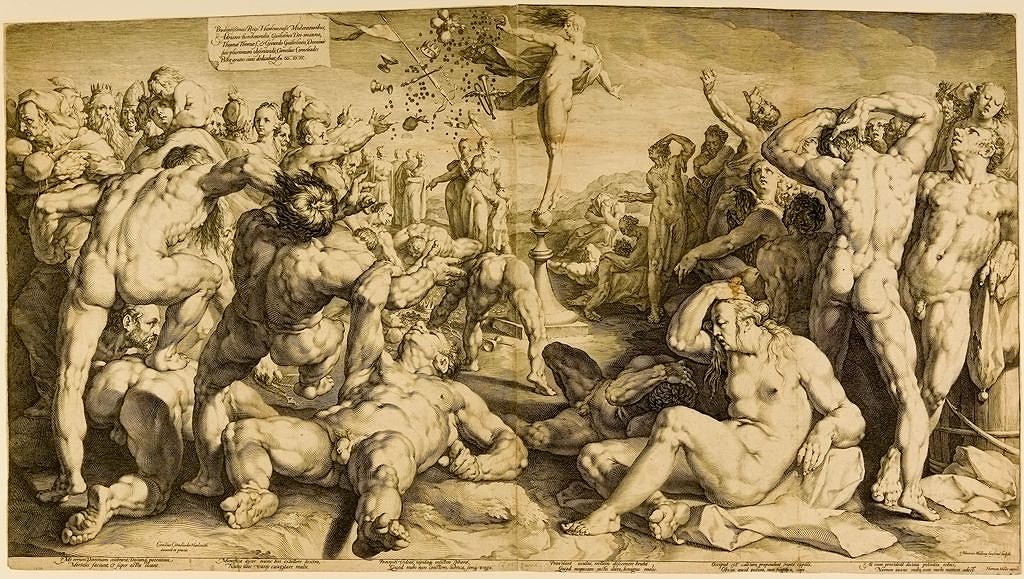DiffsGiftering

Jan Harmensz. Muller:
Blind Fortune Distributing Gifts (16th-17th century)
"Nobody ever requests the greatest gift they receive."
©2022 by David A. Schmaltz - all rights reserved
The ancients believed that Fortune distributed gifts to The Gods, rendering each unique. In more modern times, Fortune seems no less occupied bestowing gifts upon mere mortals. The Gods having been long ago gifted, Fortune's only alternative might have been long-term unemployment, an intolerable condition in a fundamental force of nature. It seems inarguable that different people seem to have been bestowed with different gifts. Some were seemingly born with the gift of gab while others' superpowers seem to quite naturally stifle them. It seems common enough that some aspire to achieve what for which they were never naturally gifted, with sometimes tragic results. When I attended Junior High, a purgatory between childhood and adulthood that every child must pass through, I was subjected to what was labeled a career assessment instrument. It purported to be capable of questioning a twelve year old kid and, by analyzing his responses, determine his best prospects for a career. I was declared a probable accountant, an appalling assessment I swore to resist with my heart and soul. I could not relate to the black and white photograph of a buzz cut geek in a short-sleeved white shirt and skinny tie, smiling beside a ten key machine. I dedicated myself to growing up to become anything but that!
It might be that such experiences weighed on me to the point that I would never fit into proper society. Early predictions often undermine long-term prospects, and while it might seem to make sense that the earliest assessments might allow for head starts in preparation for future responsibilities, credibility's lacking. I had then just begun understanding just how unpromising numbers would become, how mathematics routinely violated the very logic it purported to represent, and I already knew that we would never get along. My career, whatever it might become, would not, at my insistence, have anything to do with mathematics or numbers, the bastards, and that seemed to include accountancy, too. I already knew what I was going to do because I had a secret. By then, I was already four years into a clandestine relationship which had turned my head. I had discovered that I could write songs. Not necessarily great ones, but mine. Nothing I would then perform in public, but ones capable of engaging my attention like nothing I'd ever experienced.
This was a gift. I felt more than a little embarrassed possessing it because I had not come by it properly. Then, I believed that one came to know through formal study. If I were to become a songwriter, shouldn't I master reading music first? Shouldn't my performance in band and choir be at higher levels? I had not exhibited any evidence of becoming prodigy material. I had, in fact, rather plateaued into indifference where my study of music was concerned. My songwriting was more my secret. I was investigating, coming to understand something. Truth told, I never aspired to become a great musician. I thought myself more of a poet, but even then, not necessarily a great one. I relished the language and structuring stories, small insights tersely rendered, more like lyrics. I fancied myself more of a troubadour. I hid my gift securely beneath a bushel basket while it developed.
Fortune might unevenly distribute her gifts. Some receive riches while others, more modest inheritances. My gift began as more of a difference than a gift. Its beneficence was not initially obvious, and it might be that every gift requires a period of seasoning before fit for public display. I suppose that Leonardo scribbled his way into coherence, and it might be the first job of anyone receiving Fortune's gift to find deep embarrassment in it, even shame. It might well seem at first much more a curse than very much of a present, something separating rather than eventually distinguishing, its future state never very evident when first acquired. If one can somehow survive that initial separation and budding embarrassment when realizing that they're fundamentally different than pretty much everybody else, they might hold a chance for that separating difference to become integrated into a self never initially hinted at coming into existence. Nobody really wants to be different at first.
I refer to that sense of isolation one's gift initially induces as DiffsGiftering. The gift first seems like a difference. It might later evolve to more resemble a gift, its presence and influence surprising then. From truly humble beginnings come the greatest gifts if one can somehow quell the deep sense that they really should be running in a different direction, away from them. If not careful, one might become an accountant. If extremely fortunate, one might find themselves writing songs, unable to explain how come. The baffling difference eventually becomes identity. Fit stems from uniqueness rather than out of similarity, an alien concept to the Junior High mind and its councilors. The songwriter emerges, not necessarily after learning to fluently read music, just whenever. The emergence should surprise its possessor, and properly haunt him all his life. Nobody ever requests the greatest gift they receive.


